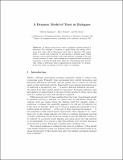Files in this item
A dynamic model of trust in dialogues
Item metadata
| dc.contributor.author | Ogunniye, Gideon | |
| dc.contributor.author | Toniolo, Alice | |
| dc.contributor.author | Oren, Nir | |
| dc.contributor.editor | Black, Elizabeth | |
| dc.contributor.editor | Modgil, Sanjay | |
| dc.contributor.editor | Olsen, Nir | |
| dc.date.accessioned | 2018-10-31T10:30:10Z | |
| dc.date.available | 2018-10-31T10:30:10Z | |
| dc.date.issued | 2018-03-06 | |
| dc.identifier | 256048834 | |
| dc.identifier | 852cb3ad-6bf0-4def-8550-bc37d5f86afe | |
| dc.identifier | 85043999809 | |
| dc.identifier | 000449911600015 | |
| dc.identifier.citation | Ogunniye , G , Toniolo , A & Oren , N 2018 , A dynamic model of trust in dialogues . in E Black , S Modgil & N Olsen (eds) , Theory and Applications of Formal Argumentation : 4th International Workshop, TAFA 2017, Melbourne, VIC, Australia, August 19-20, 2017, Revised Selected Papers . vol. Cham , Lecture Notes in Computer Science (including subseries Lecture Notes in Artificial Intelligence and Lecture Notes in Bioinformatics) , vol. 10757 LNAI , Springer , pp. 211-226 , 4th International Workshop on Theory and Applications of Formal Argumentation, TAFA 2017 , Melbourne , Australia , 19/08/17 . https://doi.org/10.1007/978-3-319-75553-3_15 | en |
| dc.identifier.citation | conference | en |
| dc.identifier.isbn | 9783319755526 | |
| dc.identifier.isbn | 9783319755533 | |
| dc.identifier.issn | 0302-9743 | |
| dc.identifier.other | ORCID: /0000-0002-6816-6360/work/48774930 | |
| dc.identifier.uri | https://hdl.handle.net/10023/16359 | |
| dc.description.abstract | In human interactions, trust is regularly updated during a discussion. For example, if someone is caught lying, any further utterances they make will be discounted, until trust is regained. This paper seeks to model such behaviour by introducing a dialogue game which operates over several iterations, with trust updates occurring at the end of each iteration. In turn, trust changes are computed based on intuitive properties, captured through three rules. By representing agent knowledge within a preference-based argumentation framework, we demonstrate how trust can change over the course of a dialogue. | |
| dc.format.extent | 16 | |
| dc.format.extent | 306519 | |
| dc.language.iso | eng | |
| dc.publisher | Springer | |
| dc.relation.ispartof | Theory and Applications of Formal Argumentation | en |
| dc.relation.ispartofseries | Lecture Notes in Computer Science (including subseries Lecture Notes in Artificial Intelligence and Lecture Notes in Bioinformatics) | en |
| dc.subject | QA75 Electronic computers. Computer science | en |
| dc.subject | Computer Science(all) | en |
| dc.subject | Theoretical Computer Science | en |
| dc.subject | T-NDAS | en |
| dc.subject.lcc | QA75 | en |
| dc.title | A dynamic model of trust in dialogues | en |
| dc.type | Conference item | en |
| dc.contributor.institution | University of St Andrews. School of Computer Science | en |
| dc.identifier.doi | 10.1007/978-3-319-75553-3_15 |
This item appears in the following Collection(s)
Items in the St Andrews Research Repository are protected by copyright, with all rights reserved, unless otherwise indicated.

